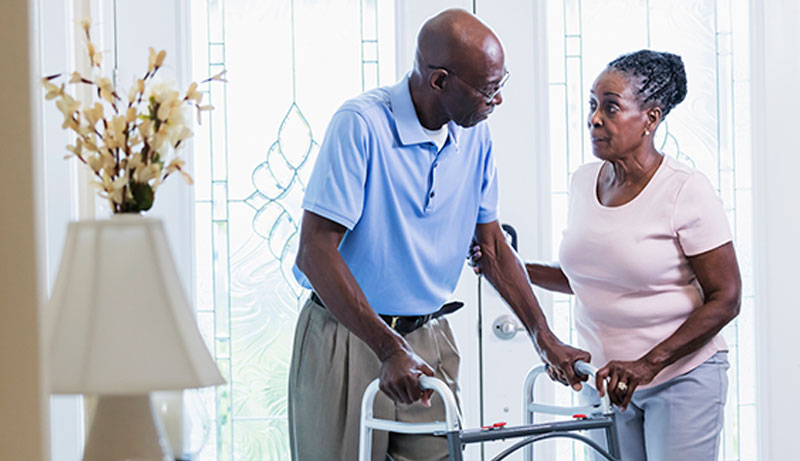
Late-stage Parkinson’s disease care can present many new challenges for family caregivers, both physically and emotionally.
A Parkinson’s disease diagnosis affects family members along with the person diagnosed. Learning what to expect as the illness progresses is paramount to being prepared for the changes to come and also to making life the best it can be on a daily basis.
Over the past few months, we’ve been posting information about what to anticipate in the early and middle stages of Parkinson’s disease. The blog posts have covered what family members can do to best help a loved one with Parkinson’s, and how At-Home Care Company can help. In this last segment in the series, we provide Parkinson’s disease care advice for taking care of someone in the final stages of this disease. Contact us online or call us at 515-292-2650 if you need extra help caring for a loved one with late-stage Parkinson’s Disease.
Later Stage Parkinson’s
In the late stages of Parkinson’s disease, a substantial level of assistance is required with activities of day-to-day living. By definition, the late stages of Parkinson’s are noted by the person’s inability to live independently. Initially, walking and standing might remain possible, however with pronounced difficulty, and as the condition continues to progress, the person will no longer be able to get out of bed or a chair without assistance.
In addition to a greater risk for falls, hallucinations and delusions can also be common. As a result, full-time, day-and-night attention is important to ensure safety.
The Effect of Late Stage Parkinson’s on Family Care Providers
At this point, the strain and everyday expectations of caregiving usually take a toll on a caregiver’s own health. It is very important for family caregivers to reach out and accept support, to stay socially connected, and to make respite care a number one priority. It’s just not practical for one person on their own to deal with the around-the-clock care necessary for a loved one in late-stage Parkinson’s.
How Caregivers Can Help with Late Stage Parkinson’s Disease Care
With increased hands-on care needed, it is essential for caregivers to learn how to safely and effectively provide this assistance to reduce the risk of doing harm to either themselves or the person being cared for.
If the person diagnosed with Parkinson’s is not already receiving physical therapy services, check with the doctor for a referral. The physical therapist, while helping maximize the person’s ability level, can also advise family caregivers on the best approaches for hands-on assistance.
One new symptom that often arises in the later stages of Parkinson’s is freezing, when the person is abruptly (but temporarily) not able to move. Methods to help break a freezing episode include:
- Using a laser pointer and asking the individual to step on the light
- Using a rhythmic sound, such as clapping, and motivating the individual to take one step with every clap
- Playing music and prompting the individual to walk to the beat
As always, remain close by once the individual is mobile to avoid a fall.
Make sure to provide an abundance of additional time for day-to-day activities such as getting dressed and eating, which are likely to take more time now. This is important in conserving the person’s self-sufficiency. Even if it requires longer to accomplish an activity, it’s always better to foster as much self-reliance as you possibly can.
Emotional and mental health issues also may appear now, including depression, memory problems, anxiety, and dementia. These additional health conditions can be very daunting for a family care provider to manage and should be brought to the attention of a loved one’s physician.
At-Home Care Company, Des Moines, IA elder care provider for the surrounding areas, is here to assist you and the person you love through each stage of Parkinson’s. Particularly in these final stages of the illness, having a care partner you can trust and rely on is vital.
Reach out to us at 515-292-2650 for a no-cost in-home consultation to learn more about our senior care services and how we can ease the transitions through Parkinson’s for both you and the older adult you love.
